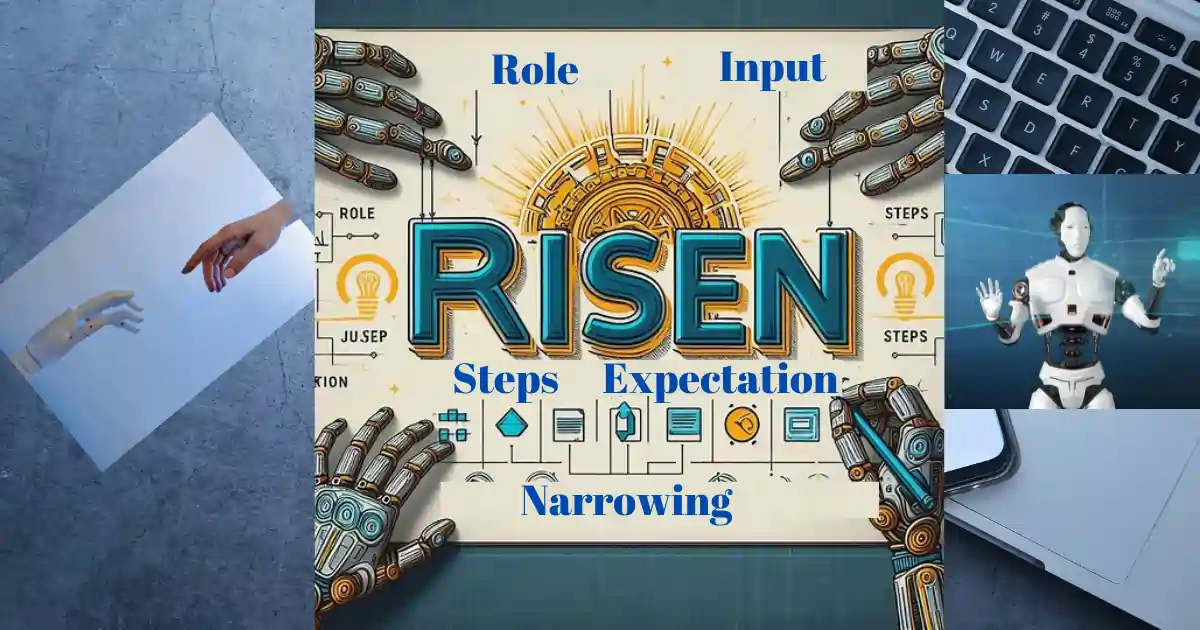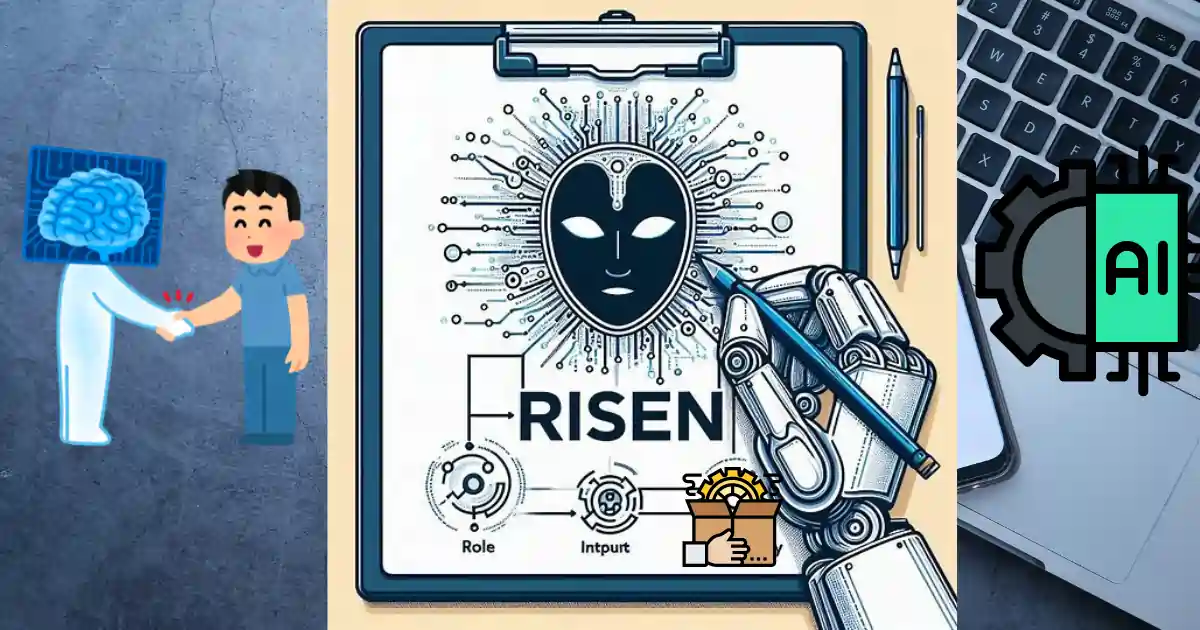Have you ever wondered how to craft prompts that truly unlock the potential of AI language models? The RISEN Framework may hold the answer you’re seeking. This innovative approach to AI prompt engineering seamlessly integrates the core principles of RISE (Role, Input, Steps, and Expectation) with the transformative element of ‘Novelty.’ But what exactly sets the RISEN Framework apart, and how can it revolutionize your AI language model interactions?
The RISEN Framework represents an advanced approach to structured prompt guidance, going beyond the foundational RISE approach to enable the crafting of prompts that not only meet specific objectives but also introduce fresh, creative insights into the process. RISEN – encompassing Role, Instructions, Steps, End goal, and Narrowing – provides a comprehensive roadmap for achieving unparalleled outcomes in AI conversations.
By harmoniously blending meticulous definition with the encouragement of creative prompt writing, the RISEN Framework elevates the practice of prompt engineering to new heights, transforming broad concepts into finely tuned, actionable strategies. Discover how this innovative framework can help you unlock the full potential of optimized AI conversations and take your AI interactions to new levels of success.
Key Takeaways:
- The RISEN Framework integrates the core principles of RISE with the transformative element of ‘Novelty’.
- It provides structured guidance for crafting prompts that meet specific objectives and introduce fresh, creative insights.
- The framework’s five pillars – Role, Instructions, Steps, End goal, and Narrowing – help optimize AI interactions and unlock unparalleled outcomes.
- By blending precision and creativity, the RISEN Framework elevates prompt engineering to new heights.
- The framework can revolutionize your approach to AI prompt engineering and AI language model interactions.
Unveiling the RISEN Framework
The RISEN Framework is an expanded version of the RISE framework, offering a broader canvas for the application of AI Prompt Engineering. It incorporates an element of novelty to the established foundations of Role, Input, Steps, and Expectation, propelling the framework beyond its original scope. This innovative addition enables the crafting of prompts that not only meet specific objectives but also introduce fresh, creative insights into the process, transcending the limitations of the RISE approach.
Transcending the RISE Approach
The RISEN Framework integrates the transformative element of ‘Novelty’ into the core principles of RISE, empowering users to craft prompts that go beyond conventional dialogue. This emphasis on novelty encourages AI interactions to become strategic pathways to success, infusing broad concepts with finely tuned, actionable strategies. By harmoniously blending meticulous definition with the encouragement of creative exploration, the RISEN Framework elevates the practice of prompt engineering, making the complex effortlessly manageable.
Introducing the Element of Novelty
The RISEN Framework’s incorporation of the ‘Novelty’ element sets it apart from the RISE approach. This innovative addition enables users to craft prompts that not only address specific goals but also introduce fresh, creative insights into the process. By encouraging this element of novelty, the RISEN Framework empowers AI interactions to become strategic pathways to success, infusing broad concepts with finely tuned, actionable strategies.

Understanding the RISEN Pillars
The RISEN Framework is a comprehensive approach to prompt crafting, encompassing five key pillars that work in harmony to enhance AI interactions. Let’s delve deeper into the significance and application of each pillar.
Role: Defining the AI’s Purpose
The Role pillar of the RISEN Framework focuses on understanding the purpose and function of the AI system. It involves clearly defining the AI’s role, whether it’s an advisor, a creator, or a problem-solver. Establishing the AI’s role helps to align the prompt with the desired outcomes and ensures that the interaction is focused and effective.
Input: Providing Contextual Data
The Input pillar of the RISEN Framework emphasizes the importance of providing the AI with relevant and contextual data. This can include specific questions, statements, or sets of information that the AI can use to formulate a response. Crafting comprehensive and informative input helps the AI better understand the context and generates more relevant and useful responses.
Steps: Outlining Clear Instructions
The Steps pillar of the RISEN Framework focuses on outlining clear and structured instructions for the AI to follow. This includes breaking down the prompt into specific, actionable steps that the AI can execute. By providing a clear roadmap, the AI can better understand the desired process and deliver results that align with the user’s expectations.
Expectation: Specifying Desired Outcomes
The Expectation pillar of the RISEN Framework requires the user to clearly define the desired outcome or goal of the AI interaction. This could be a comprehensive report, a brief summary, or any other specific deliverable. Clearly articulating the expected outcome ensures that the AI’s response is tailored to meet the user’s needs.
Narrowing: Setting Boundaries and Focus
The Narrowing pillar of the RISEN Framework involves setting boundaries and focusing the AI’s efforts. This can include imposing word limits, focusing on specific areas or topics, or providing other constraints to ensure that the AI’s response is concise, relevant, and aligned with the user’s requirements. Narrowing the scope of the prompt helps to optimize the AI’s output and prevent it from straying into irrelevant or undesired territory.
Risen Framework of Effective Prompt Crafting AI
Structured Guidance for AI Interactions
The RISEN Framework offers a structured approach to crafting effective prompts for AI interactions. By incorporating the five key pillars of Role, Input, Steps, Expectation, and Narrowing, the framework provides users with a comprehensive guide to engage with AI language models in a more strategic and impactful manner. This structured guidance helps to ensure that the AI’s responses are tailored to the user’s specific needs, while also encouraging creative and innovative thinking.
Blending Precision and Creativity
The RISEN Framework skillfully blends the elements of precision and creativity, enabling users to craft prompts that are both meticulously defined and open to innovative solutions. By clearly outlining the AI’s role, providing contextual data, outlining steps, specifying desired outcomes, and setting boundaries, the framework ensures that the AI’s responses are targeted and aligned with the user’s objectives. At the same time, the framework’s emphasis on the element of novelty encourages the AI to explore new avenues and introduce fresh, creative insights, thereby enhancing the overall value and impact of the interaction.
Applying the RISEN Framework
The RISEN Framework can be effectively applied to a wide range of real-world scenarios, demonstrating its versatility and practical value. From meal planning and study session organization to event planning and market trend analysis, the framework provides a systematic approach to leveraging AI for various tasks and objectives. By following the RISEN pillars, users can craft prompts that yield tailored, actionable, and innovative responses from AI language models, ultimately enhancing efficiency, productivity, and decision-making.
Meal Planning
In the context of meal planning, the RISEN Framework can be applied to create a well-organized weekly meal plan that accommodates dietary preferences, meets nutritional requirements, and fits within scheduling constraints. By defining the AI’s role as a meal planning coordinator, providing input on dietary needs and caloric targets, outlining clear steps for meal preparation and shopping, specifying the desired outcome of a comprehensive meal plan, and narrowing the focus to budget-friendly and easily accessible ingredients, users can leverage the RISEN Framework to generate a detailed and practical meal schedule.
Study Session Organization
The RISEN Framework can also be applied to the organization of study sessions, helping students and educators optimize their learning experiences. By defining the AI’s role as a study session planner, providing input on the subject matter and learning objectives, outlining clear steps for structuring the session, specifying the desired outcome of a productive and engaging study plan, and narrowing the focus to accommodate time constraints and individual learning styles, the RISEN Framework can guide the creation of effective study session plans.
Event Planning
The RISEN Framework can be utilized in the context of event planning, enabling organizers to craft comprehensive and strategic plans for various types of events, from corporate gatherings to social celebrations. By defining the AI’s role as an event planner, providing input on the event’s purpose, theme, and target audience, outlining clear steps for logistics and programming, specifying the desired outcome of a successful and memorable event, and narrowing the focus to address budgetary considerations and venue limitations, the RISEN Framework can support the development of meticulously planned and executed events.
Advantages and Benefits
The RISEN Framework for prompt crafting AI offers several key advantages and benefits. Firstly, it enhances AI engagement by providing a structured approach to prompt creation, ensuring that the AI’s responses are tailored to the user’s specific needs and objectives. By clearly defining the AI’s role, providing comprehensive input, outlining steps, specifying desired outcomes, and setting boundaries, the framework facilitates more meaningful and productive interactions between users and AI language models.
Increased Efficiency and Productivity
The RISEN Framework also contributes to increased efficiency and productivity by streamlining the prompt engineering process. By guiding users through a systematic approach to prompt creation, the framework helps to eliminate ambiguity, reduce iteration cycles, and optimize the AI’s output. This, in turn, leads to faster turnaround times, higher-quality results, and more effective utilization of AI capabilities, ultimately enhancing the overall productivity of users and their organizations.
Fostering Innovation and Creativity
Furthermore, the RISEN Framework fosters innovation and creativity by encouraging users to think beyond conventional prompts and explore novel approaches. The inclusion of the ‘Novelty’ element within the framework empowers users to craft prompts that not only meet specific objectives but also introduce fresh, creative insights. This encourages AI interactions to become strategic pathways to success, infusing broad concepts with finely tuned, actionable strategies and driving continuous improvement and innovation.
Best Practices and Implementation Tips
To effectively implement the RISEN Framework, it is crucial to maintain clarity in defining the AI’s role and the desired expectation or outcome. Clearly articulating the AI’s purpose and the user’s goals helps to align the prompt with the intended outcomes, ensuring that the AI’s responses are tailored to meet the user’s needs.
Clarity in Role and Expectation
Defining the AI’s role and the expected outcome is a fundamental step in the RISEN Framework. By clearly specifying the AI’s purpose, whether it’s an advisor, a creator, or a problem-solver, and the desired deliverable, users can ensure that the prompt is aligned with their objectives. This clarity helps to guide the AI’s responses and ensures that the interaction is focused and effective.
Comprehensive Input and Steps
Providing the AI with comprehensive input and outlining clear, actionable steps is another key best practice when using the RISEN Framework. Ensuring that the AI has access to all the relevant information and a well-defined roadmap to follow helps to minimize ambiguity and improves the quality and relevance of the AI’s responses. This comprehensive approach enables the AI to better understand the context and generate more targeted and useful outputs.
Iterative Refinement
The RISEN Framework encourages an iterative approach to prompt crafting. Users should be prepared to refine and adjust their prompts based on the AI’s initial responses, continuously refining the input, steps, and narrowing to optimize the outcomes. This iterative process helps to unlock the full potential of the RISEN Framework and ensures that the AI’s outputs align with the user’s evolving requirements. By embracing this flexible and dynamic approach, users can continuously improve their prompts and achieve better results.
Example of prompt crafting using RISEN framework
Certainly! The RISEN framework is an extension of the RISE framework, adding a “Narrowing” component to further refine the prompt. Here’s an example of how you might craft a prompt using the RISEN framework:
Role: As a content creator, your role is to generate engaging blog posts for a travel website.
Input: The input includes the target audience’s preferences, such as solo travelers, couples, or families, and their interest in budget-friendly or luxury destinations.
Steps:
- Choose a travel theme based on the audience’s preferences.
- Research destinations that align with the chosen theme.
- Outline the structure of the blog post, including introduction, main content, and conclusion.
- Write the draft of the blog post, incorporating SEO best practices.
Expectation: The expected outcome is a well-structured, SEO-optimized blog post that appeals to the target audience and encourages them to explore the featured destinations.
Narrowing: Focus on destinations in Europe that are suitable for travel during the summer season and ensure the blog post is between 800-1000 words.
By incorporating the RISEN framework into your prompt crafting, you create a clear and detailed guide for the AI to follow, which can lead to more accurate and targeted content generation. Remember to be specific in each section to achieve the best results from the AI’s response.
Conclusion
The Risen Framework of Effective Prompt Crafting AI represents a transformative approach to engaging with AI language models. By incorporating the core pillars of Role, Input, Steps, Expectation, and Narrowing, coupled with the element of Novelty, the framework empowers users to craft prompts that yield tailored, impactful, and innovative responses.
Through its structured guidance, the RISEN Framework enhances AI engagement, increases efficiency and productivity, and fosters a culture of creativity and continuous improvement. As organizations and individuals continue to leverage the power of AI, the RISEN Framework stands as a comprehensive and adaptable tool, equipping users with the necessary skills and strategies to harness the full potential of AI language models and drive meaningful progress in their respective domains.
The RISEN Framework’s holistic approach to prompt engineering marks a significant advancement in the field, bridging the gap between meticulous definition and creative exploration. By blending precision and innovation, this framework empowers users to unlock new possibilities, optimize AI interactions, and propel their endeavors to greater heights. As the world continues to embrace the transformative potential of AI, the RISEN Framework emerges as a powerful and indispensable resource, guiding individuals and organizations towards a future where the symbiosis between human ingenuity and AI capabilities unlocks unprecedented possibilities.

